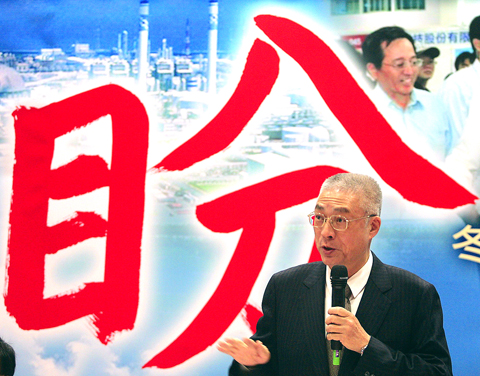Premier Wu Den-yih (吳敦義) said yesterday the government would soon lift a ban on high-tech industries setting up operations in China, saying regulations for the review and approval of applications were still being deliberated on by the Ministry of Economic Affairs (MOEA).
“I recently had a briefing from the MOEA [on reviewing investment bans on China] and was in support of its suggestions [to ease restrictions], but we still need to work out a detailed plan, as well as rules for reviewing applications,” Wu said at a press conference mapping out his Cabinet’s policies for this year.
Refusing to go into details on whether the MOEA would allow panel makers to invest in China and chipmakers to operate more advanced fabs this month as Minister of Economic Affairs Shih Yen-shiang (施顏祥) had said several weeks ago, Wu set out his position on the issue.

PHOTO: REUTERS
“The principles when handling the issue are simple. We will require that industries keep their ‘roots’ in Taiwan ... and we will allow industries to invest if they will lose their competitive edge [over foreign counterparts] should the restrictions remain,” Wu said.
Wu said the government would require industries to adopt more advanced technology locally than in their Chinese investment projects and have higher investment in Taiwan than in China.
Using the metaphor of a tree to represent his idea, Wu said: “It can’t be that the roots [in Taiwan] weigh 2kg, while the branches and leaves [in China] weigh 10kg.”
Wu said he hoped a consensus could be reached between the government and industry whereby the government allows firms to invest in China to enhance their competitiveness, while the firms would show more consideration for Taiwan.
“If we have a strong consensus on this and it is imperative [for them to expand in China], we will not keep their arms and legs tied,” Wu said.
Taiwanese companies can only invest in low-end packaging and testing facilities in China, while panel makers are prohibited from building factories.
On the government’s proposal to sign an economic cooperation framework agreement (ECFA) with China, Wu said the government still hoped the deal could be signed by May, the planned date for the next round of cross-strait negotiations.
Formal negotiations between the two sides on the ECFA are set to begin on Jan. 20.
Officials will brief members of the legislature on the progress of the talks every month, including Legislative Speaker Wang Jin-pyng (王金平), caucus whips and the chairpersons of related legislative committees, Wu said.
Regarding the controversy on the relaxation of US beef imports, Wu said the issue has taught the administration a lesson that it has to “empathize with the people” when implementing policy decisions.
The government had assessed US beef based on the scientific standards of global organizations and secured better conditions than the South Koreans in the negotiations and had “assumed” that the Taiwan-US protocol would be supported by the public, Wu said.
Wu said the element the government failed to factor in, and which resulted in the controversy, was that the agreement was “not considerate of the feelings of the public.”
“Following that lesson, the government will use plain language when talking to the public about the ECFA,” Wu said.

Alain Robert, known as the "French Spider-Man," praised Alex Honnold as exceptionally well-prepared after the US climber completed a free solo ascent of Taipei 101 yesterday. Robert said Honnold's ascent of the 508m-tall skyscraper in just more than one-and-a-half hours without using safety ropes or equipment was a remarkable achievement. "This is my life," he said in an interview conducted in French, adding that he liked the feeling of being "on the edge of danger." The 63-year-old Frenchman climbed Taipei 101 using ropes in December 2004, taking about four hours to reach the top. On a one-to-10 scale of difficulty, Robert said Taipei 101

Nipah virus infection is to be officially listed as a category 5 notifiable infectious disease in Taiwan in March, while clinical treatment guidelines are being formulated, the Centers for Disease Control (CDC) said yesterday. With Nipah infections being reported in other countries and considering its relatively high fatality rate, the centers on Jan. 16 announced that it would be listed as a notifiable infectious disease to bolster the nation’s systematic early warning system and increase public awareness, the CDC said. Bangladesh reported four fatal cases last year in separate districts, with three linked to raw date palm sap consumption, CDC Epidemic Intelligence

US climber Alex Honnold left Taiwan this morning a day after completing a free-solo ascent of Taipei 101, a feat that drew cheers from onlookers and gained widespread international attention. Honnold yesterday scaled the 101-story skyscraper without a rope or safety harness. The climb — the highest urban free-solo ascent ever attempted — took just more than 90 minutes and was streamed live on Netflix. It was covered by major international news outlets including CNN, the New York Times, the Guardian and the Wall Street Journal. As Honnold prepared to leave Taiwan today, he attracted a crowd when he and his wife, Sanni,

Taiwanese and US defense groups are collaborating to introduce deployable, semi-autonomous manufacturing systems for drones and components in a boost to the nation’s supply chain resilience. Taiwan’s G-Tech Optroelectronics Corp subsidiary GTOC and the US’ Aerkomm Inc on Friday announced an agreement with fellow US-based Firestorm Lab to adopt the latter’s xCell, a technology featuring 3D printers fitted in 6.1m container units. The systems enable aerial platforms and parts to be produced in high volumes from dispersed nodes capable of rapid redeployment, to minimize the risk of enemy strikes and to meet field requirements, they said. Firestorm chief technology officer Ian Muceus said